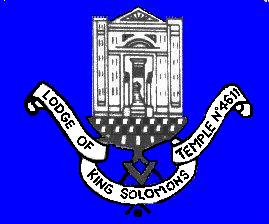AN ORATION ON THE MURISTAN BY CANON H. W. CURTIS. (at the Consecration)
The spot where we meet, now called the Muristan, has many historic associations, and they are specially appropriate to the ceremony of the Consecration of a Masonic Lodge; for the virtues of charity and true brotherhood have been eminently shown forth by those whose buildings occupied this site.
Under the foundations of the present and adjacent Lutheran Church were found sections of what was probably the North wall of Jerusalem at the time our era began. Not fifty yards from where we stand probably was the city gate through which Christ carried His Cross; and the hill of Calvary and the Holy Sepulchre are about the same distance from us.
When pilgrims began to come to the holy sites, there was great call for labours of generous love on their behalf. Many were poor, many fell sick, or were wounded and broken down by the toils of the dangerous way. There was need for people who would feel sympathy for them, and would translate that sympathy into some permanent organisation in Jerusalem, for the succour of pilgrims. And it was here on this very site that such labours of thoughtful and generous care were carried out.
First, the great Emperor Charlemagne founded here in the ninth century a hospice for pilgrims. Here, in the eleventh century, some charitable merchants of Amalfi in Italy erected and endowed two hospices, one for men and one for women. After the capture of Jerusalem in 1099, the famous Order of the Knights of St. John, or Knights Hospitallers, was founded, embodying the idea of livelong selfdevotion to the care of the sick and wounded. Their great mass of buildings was on this site; and some relics still remain, thus on this spot was begun that Red Cross work, which knows no distinction of race or creed, but simply endeavours to bring help where help is needed.
The buildings were given by the Sultan to the German Emperor in 1869 and restored by the latter. The following description of the work that used to be done on this site is interesting;
"All pilgrims were admitted to the Hospital of St. John without distinction; and the inhabitants in general, of whatever religion they were, looked upon the administrator of the Hospital as common father of the poor of the city."
